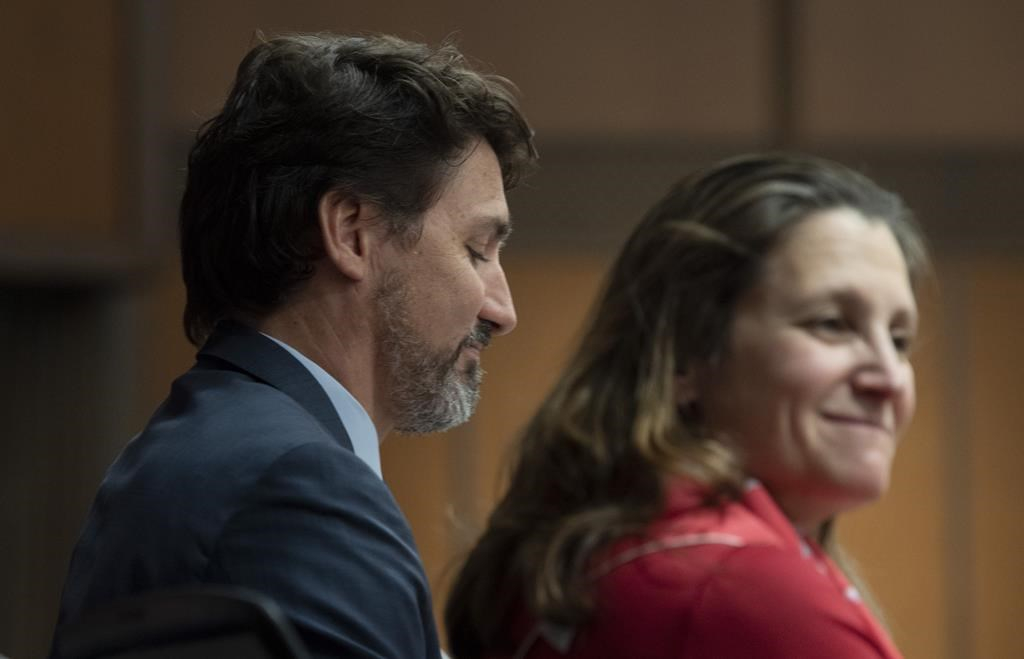Support strong Canadian climate journalism for 2025
The government is mulling potential financial help to ease the burden of the novel coronavirus on businesses and individuals after its first cabinet committee meeting on the subject, Deputy Prime Minister Chrystia Freeland said Wednesday.
"We are very mindful that an economic impact is certainly being felt in the global economy and is beginning to be felt in Canada, and that's one of the things we need to turn our attention to," Freeland, the committee chair, told reporters in Ottawa.
"So I would just say about that, watch this space."
Prime Minister Justin Trudeau announced the newly formed committee Wednesday morning, and it met for the first time later that afternoon.
The cabinet committee for COVID-19, which is the respiratory disease linked to the strain of novel coronavirus that originated in Wuhan, China, will complement the work being done by the government's incident response group.
The cabinet committee will continue to monitor the health impacts of the virus to make sure the government response takes all possible measures to prevent and limit the spread in Canada, Trudeau said in a written release Wednesday.
Trudeau also told reporters the committee will be keeping an eye on the economic impacts of the virus.
"We need to make sure that people make the right decisions. That's why we put forward a committee that will be responsible for ensuring that Canadians have the right frame to make the good decisions for their families, for their communities," Trudeau said in St-Jerome, Que.
"We need to keep alert, but we need to keep moving forward in a way that keeps Canadians safe and keeps our economy rolling."
The risk of community transmission of the virus is still considered low in Canada, according to the Public Health Agency of Canada.
Trudeau said the government has been watching the global impact of the virus on the economy closely.
"We're seeing that in terms of tourism there's an impact, there's an impact on investment, on the airline industry, on the auto industry as well. We're seeing a slow down," he said.
He pointed to supply-chain disruptions in China affecting Canadian businesses too.
"There will be an impact and we're there to try to find solutions together with companies and communities."
Freeland said there may also be micro-economic impacts on individuals who may have to say home because they are sick, or even be quarantined.
"We will be ready to act when it's necessary," she said.
"We are monitoring the outbreak and we remain ready to deploy fiscal measures as appropriate."
The committee will include several other cabinet ministers and Kirsty Duncan, deputy government House leader.
Duncan is a medical geographer who studied pandemics before she entered politics — including writing a book on the 1918 Spanish flu.
Freeland emphasized that the entire country needs to be involved in the response to the virus.
Hajdu said employers can also play a large part by making it easier for people to work from home or stay away if they are unwell.
And everyone can do their part by washing their hands and staying away from others if they are sick, she said.
Canada now has 33 cases of the new coronavirus, most of them in Ontario.
But globally, the number of countries detecting new cases has been increasing every day. There are now at least 93, 090 confirmed cases in 76 countries, including more than 3,000 deaths, according to the latest numbers from the World Health Organization.
This report by The Canadian Press was first published March 4, 2020.





Comments
Financial help will be more effective in the tourism industry this year - far more suffering about to happen there. Need to support those folks so that they are around next year when the COVID vaccine spreads its happy wings.